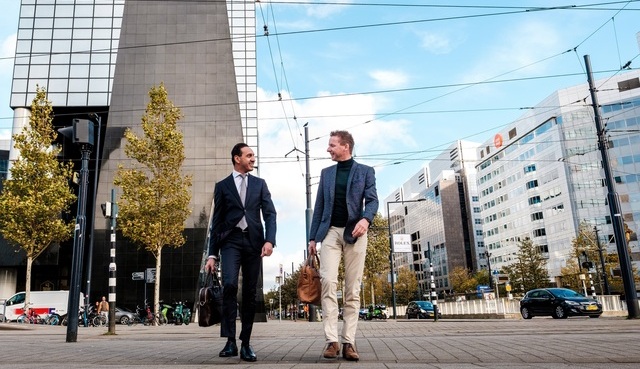
We are often asked by employers, if they could reimburse the costs of the business trips of their employees tax free and if so, what are the terms and conditions thereof. Most of them opt for a fixed reimbursement per day, the ‘per diem’. Is that possible and if so, what do employers need to take into account or are there other options? We will explain it in this blog.
Comparable to state officials?
As part of the terms of employment, the collective labour agreement for state officials (hereinafter called: ‘the CLA’), the Dutch government pays them maximized or fixed allowances for accommodation, meals and other expenses on business trips. The allowances for national business trips are the same for the entirety of the Netherlands. For international business trips, the hight of the maximum or fixed allowances depends on the visited country, territorial section and / or city.
Employers of non-state officials are allowed to apply the maximized and fixed allowances from the CLA to their employees. In order for the allowances to be tax exempt, the employee must be, from a cost spending point of view, comparable to a state official on a business trip. For that, it is important, that the employee should not work too much overtime on a business trip and should also not eat his lunch at the office, factory, et cetera abroad.
Allowances for national business trips
The amounts of the national business trips are only tax exempt to the following amounts (in 2024):
- Small expenditures during daytime hours: € 5,93
- Small expenditures in the evening time hours: € 11,86
- Breakfast: € 13,88
- Lunch: € 11,88
- Diner: € 29,82
- Accommodation: € 140,57
Only the first mentioned allowance is tax exempt unconditionally. For the other expenses there are one or more criteria that need to be met.
Allowances for international business trips
For international business trips, the amounts mentioned in the appendix to the CLA are fully tax exempt. The costs are split between accommodation ('logieskosten') and other expenses ('overige kosten'). The ‘logieskosten’ are a maximum amount. The tax exemption, therefore, only applies to the amount invoiced by the accommodation.
The allowance for ‘overige kosten’ is a fixed amount, the must be spliced into:
- 1,5% for every hour the business trip lasts (maximum 36% per day)
- 12% for every period between 06:00 and 08:00 during the business trip (breakfast)
- 20% for every period between 12:00 and 14:00 during the business trip (lunch)
- 32% for every period between 18:00 and 21:00 during the business trip (dinner)
After 60 contiguous days, the tax exemption will only be applicable to half of the allowance for ‘overige kosten’.
30%-ruling for posted workers
When employees are not, from a cost spending perspective, comparable to state officials on a business trip, their employers must seek other options for a fixed reimbursement of the extra costs of the business trip. This option could be found in the 30%-ruling for posted workers. With that, employees can trade 30% of their daily gross salary for a net allowance of the same amount, for every day of the business trip. The net allowance is tax exempt.
The 30%-ruling for posted workers, in contrary to the ruling for incoming workers, does not need a formal decision from the Dutch Tax Office and is also not restricted by a minimum or maximum gross salary or a maximum duration of five years. Lastly, the benefit is always 30% of the gross daily salary.
The 30%-ruling for posted workers does, however, also has some requirements:
- The employee is posted to countries in:
- Asia
- Africa
- Latin America (including Aruba, Curaçao, Sint Maarten and Caribbean Netherlands)
- Europe (Balkans, Baltic States, Central Europe and Post-Soviet States)
- The employee must be posted at least 45 calendar days in a period of twelve months
- This period consists of only periods of at least fifteen contiguous calendar days
- If so, also contiguous periods of posting of at least ten days may be added
As you can see, the 30%-ruling for posted workers is cost neutral, because it does not require extra payroll costs. It can, however, affect the employee’s entitlement to holiday allowance, social security benefits, pensions, et cetera. Therefore, we recommend to agree the 30%-ruling for posted workers with the employees.
Substantiated fixed reimbursement
If the abovementioned options are not applicable to your employees, it is always possible to reimburse the costs of a business trip to employees based on declarations of invoices and receipts. These costs are all tax exempt. However, it does bring a lot of red tape.
To avoid the red tape, it is possible to pay a fixed reimbursement for the extra costs of a business trip. The fixed reimbursement must be based on a substantiation. For that, an employee or a (representative group of) employees need to make declarations of the costs of business trips in a research period of (at least) three months.
After the research period, you can calculate the average costs of a business trip per day. This amount could serve as the (maximum) tax exempt fixed reimbursement for business trips per day. If desired, it is possible to use the research to substantiate more than one fixed reimbursement, based on the job function, visited location, et cetera.
In short
You have read that there are multiple options for facilitating a (fixed) reimbursement for you employees who have extra costs while on a business trip. However, it is important to pay attention and arrange things properly. Visser & Visser will be happy to help you organise the reimbursement for business trip of your employees. Please feel free to contact us.
Bonus material?: News about the 30%-ruling for incoming workers
As of 2024, the rules for the 30%-ruling for incoming workers have changed. This is because the Dutch Government wishes to decrease the differences between foreign and Dutch employees. Two changes have been made to the 30%-ruling for incoming workers:
- The trade-off of gross salary for a nett allowance is maximised at a percentage of the maximum salary of workers in (semi-)public jobs, the so-called ‘balkenendenorm’. This is named after the former Dutch Prime Minister Jan-Peter Balkenende, introduced during his time in that function and equals the salary of the Prime Minister of the Netherlands. Currently the ‘balkenendenorm’ amounts to € 233.000 per year.
- The percentage of the trade-off turned into a sliding scale:
- 30% in the first twenty months
- 20% in the next twenty months
- 10% in the last twenty months
In case the runtime of the 30%-ruling is less than five years, the months will be cut backwords. This means that, for example, the runtime is 40 months, the employee loses ten months benefit of a percentage of 10%.
